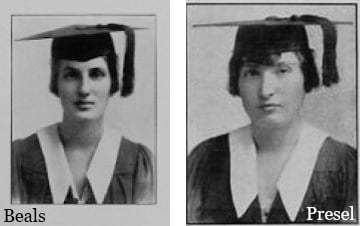Abstract
In this dual interview, classmates Rose Presel and Lillian Dorothy Beals speak extensively about their classes at Pembroke, and the different professors they had. They discuss social life at the college especially the four dances held each year and the Pembroke traditions of Sophomore Masque, May Day, and Ivy Day. In part one, they describe the dynamic between Pembroke and Brown; that as underclassmen they were not allowed to walk across the Brown campus at any time. They discuss professor-student relationships, classes in the foreign language departments, their feelings towards Dean Lida Shaw King, World War I and the close collaboration between Pembroke College and Hope High School.
In part two, they speak about dating, marriage, fraternity dances, and the occupational expectations of female graduates. Beals tells the story of her fiancé who was killed in WWI and Presel reflects on the contrast between off-campus and dormitory living. They discuss the particularities of attending college during World War I including picking oakum, which was used as bandages in France, and knitting scarves and helmets during class for the Red Cross.
Part 1
Part 2
Suggested Chicago style citation: Beals, Lillian Dorothy. Interview. Pembroke Center Oral History Project, Brown University.
Biography
Lillian Dorothy Beals received her A.B. from Brown University in 1918. After college she worked in the estimating department of a jewelry manufacturer in Providence. She attended Johnson & Wales Secretarial School run by Miss Johnson and Miss Wales on Olney Street in Providence where she took shorthand and typewriting. Beals later married and raised two children.
Rose Presel began Pembroke at age 16 after attending Hope High School in Providence, RI. She received a A.B. from Pembroke College in 1918, an A.M. in 1935 and later a Ph.D. in Philosophy. Presel wrote one of the 1918 Songs of the Women’s College in Brown University (attached below) and was a well-known musician throughout New England, New York, and Massachusetts and played duo-piano concerts with her sister; she was the longest member and past president of the Chopin Club. After Brown, she became the head of the Foreign Language Department at Hope High School where she taught for twenty years. She held numerous positions and memberships in academic associations across the nation. Notably, she was past president of the New England Modern Language Association and a consultant for the Rhode Island Board of Education. She passed away on June 1st, 1998.
